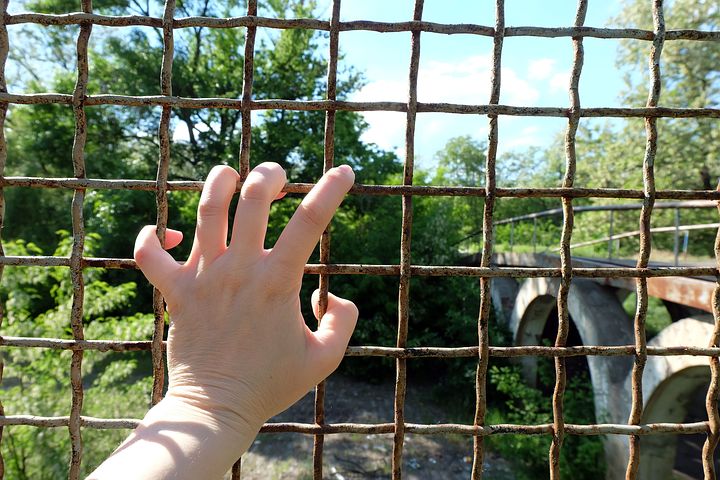The Other Side of the Story
 Assuming the Other Side.
Assuming the Other Side.
There is always the other side. The confrontation took place in my driveway. He glowered at me and I didn’t even know why he was angry.
“I know more about this than you do. I’ve talked to Donna and to Annie, and they told me what’s going on.”
To start with, I never told him or anyone else that I knew anything. He assumed I did because of my friendship with the person involved. In addition, Donna lived in Oregon, Annie lived in Alabama, and I was in Virginia. Neither of them had seen the person in question, nor had they spoken individually with the same. Yet they knew more about it than those of us who rubbed shoulders with the parties. How could that be?! Yet he proclaimed it as truth.
I still smile when I remember that scenario many moons ago. A family crisis had everyone talking to everyone else except the parties involved. The family was listening to the wrong people in order to get the true story. They heard one person’s side and automatically assumed it was the right side. I happened to know the other side because I had seen and observed first-hand the conflict of which no one else seemed to know – but wasn’t mine to tell.
Have you been there? Have you jumped to conclusions after listening to only one person in a conflict? How many times have you judged someone guilty after hearing only one side of a story?! Have you been assumed guilty before being asked to share your experience? I’ve been there. It happens to all of us.
 When Guilty clashes
When Guilty clashes
I’ve found it interesting – in my observations – that usually the person who does the most talking is the one who is the most “guilty”. In order to turn the tide against the other person lest she be found guilty, the talker embarks on a journey of giving information that might be partly true but is tainted enough to portray the other person in a bad light. Her purpose is not restoration, but keeping the momentum of the band wagon rolling. I’ve come to realize that in most cases, the person who talks first, who talks the loudest, and who talks the longest is usually more wrong than right.
I remember the day one of my kids stormed off the school bus to inform me just how unfair his teacher was. The entire class was upset, he said. He didn’t plan to go to school the next day because it was time to boycott. I listened for a few minutes. Had I believed him without questioning, the teacher was so guilty she needed to be fired. I confess my blood pressure was starting to climb at the injustice of the teacher – even though I wasn’t in the room when the instance occurred!
Yet when I offered, “How about if I go to the school tomorrow morning and ask her about what happened? How about if I hear her side of the story?”, he changed his tune.
“Oh Mama, I don’t think you need to go,” he said. “I think we can work it out.”
I turned my head so he wouldn’t see me smile. He’d been had, and he knew it. What if I had immediately taken his side? What if I declared his teacher unfit as a teacher? What attitude would he have carried with him to school the next day?
 Hearing the other side
Hearing the other side
If we’d take the time to listen to the other side, we’d be further ahead, and so would the other parties. When we listen, we need to assume the other party is not guilty until we have heard their perspective.
We know it’s unfair to listen to only one side when our kids tangle. Most parents hear both sides before meting out discipline. Not many parents deal out consequences until they have taken the time to hear both sides of the story. We need to do the same when we are relating to the adults in our lives.
I had a friend tell me one day, “Well, I know what is the truth because I talked to Sally, and she heard it from Bill.”
My friend never once asked for the opinions of anyone else. She didn’t ask Bill, and she certainly never asked to sit down with the “guilty” parties to hear their hearts. Yet somehow, she just knew what was truth!
A solution for the problem
The problem is that we listen to one person and assume they are telling the truth, the whole truth, and nothing but the truth. Instead of questioning (like I did with my son), we are ready to charge toward the offender without first asking to hear his heart and his perspective. Even if we do ask, we often come across knowing the whole story before we’ve even heard his heartache. Our agenda is not to bring healing, but to tear the “guilty” person apart.
We can do better than that. We need to do better than that. Whether it’s with our kids, our families, our community, or our church, we need to be folks whose response to things we hear will bring healing and not divisiveness. We need to model it to our kids and to the folks with whom we rub shoulders.
How much better relationships will be when we choose to listen to the other side before bringing condemnation. We should feel shame in being part of juicy gossip instead of feeling privileged. Rather than helping spread untruth before seeking truth, we should work at being part of a team that seeks reconciliation instead of retribution.
This is something I’ve been working on in my responses.
Will you join me?

This is a repost from five years ago. I continue to be amazed at the many people I know who refuse to listen to the other side of a story.






